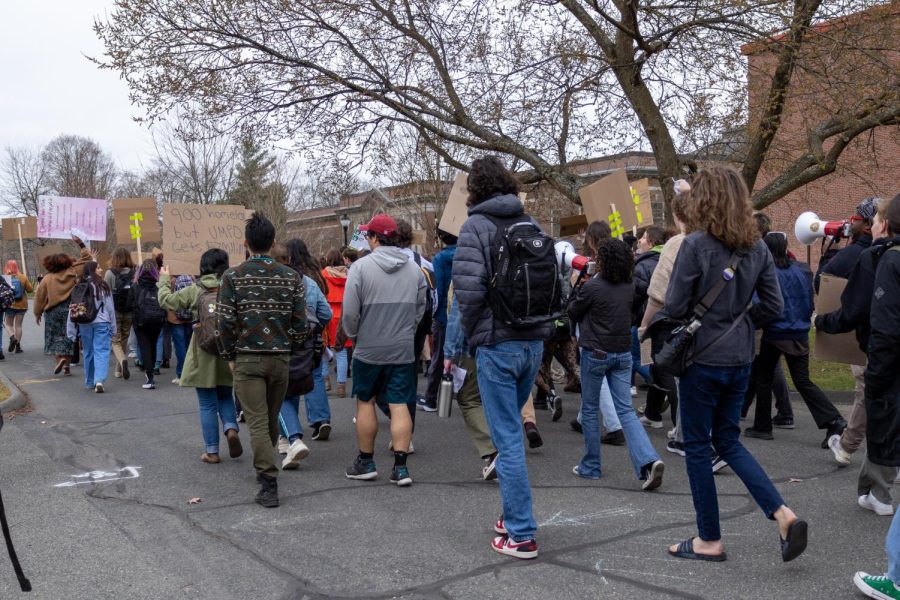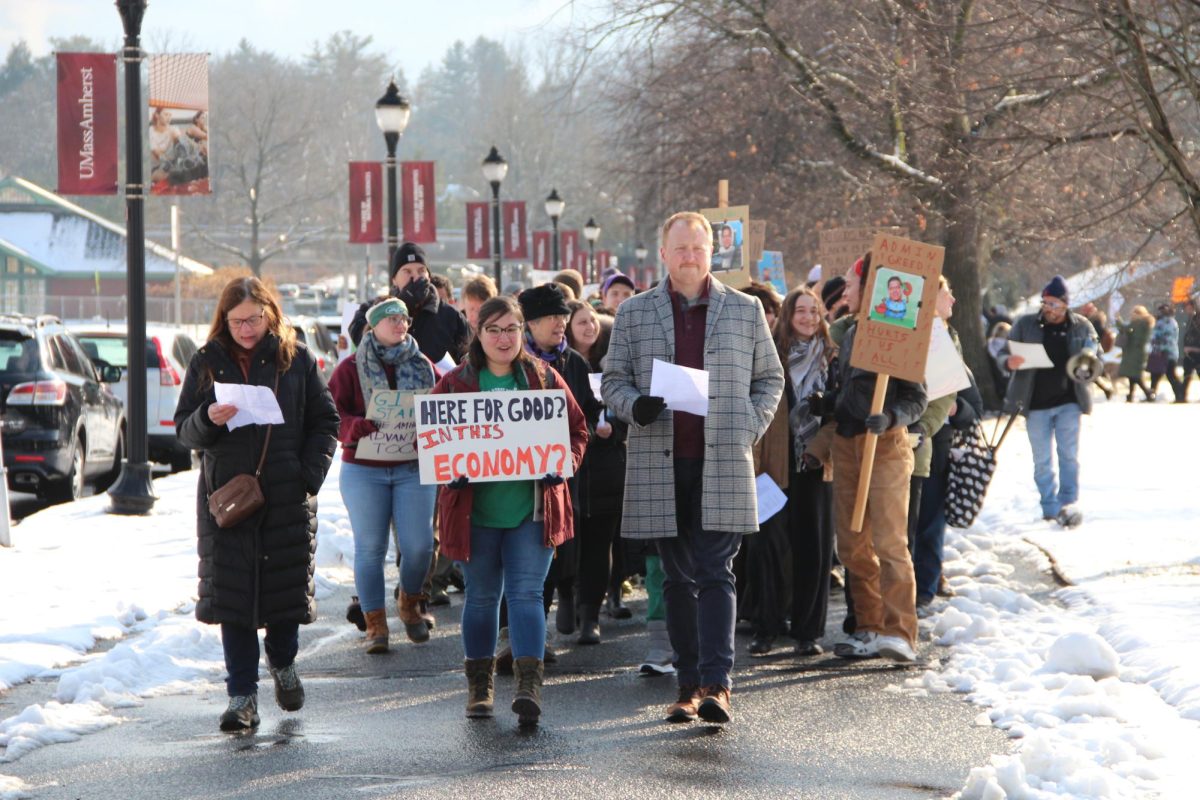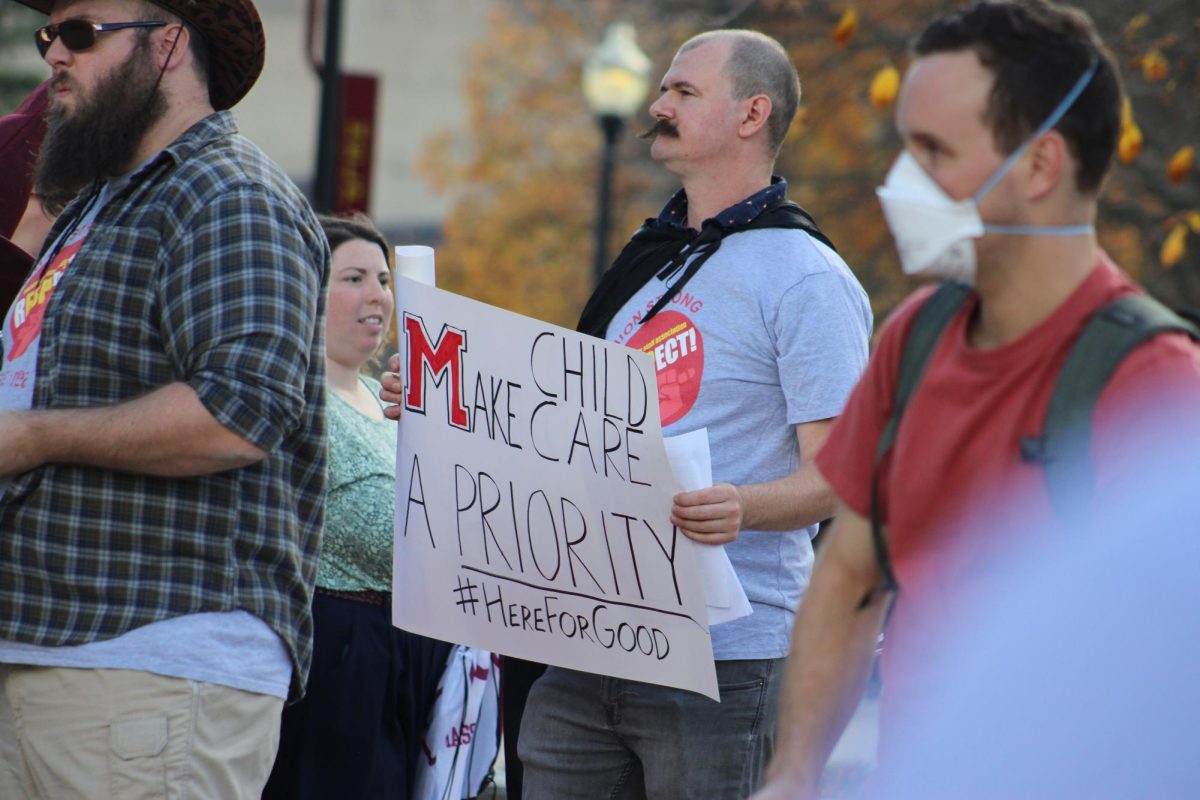On the afternoon of Wednesday, April 5, a group of around 100 students gathered in front of the University of Massachusetts Student Union in response to the latest University update regarding the arrest of an engineering student of color this past November. Those in attendance advocated for the abolition of the UMass Police Department.
The demonstration was organized by a coalition of student groups including UMass Amherst Cops Off Campus, Revolutionary Student Action, Prison Abolition Collective and Revolutionary Marxist Students. Markers and cardboard were provided for demonstrators to make their own signs, including one which read, “UMPD: F*** off and never come back!”
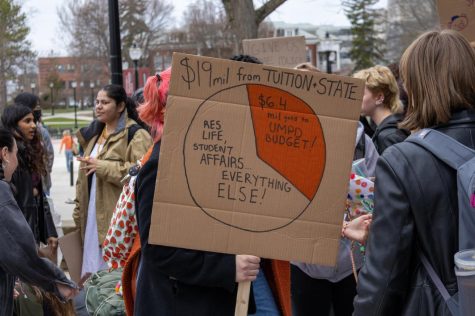
Kala, a junior social thought and political economy major who wished to keep her last name anonymous, spoke to the crowd. “This situation started with what offense? With walking in the wrong place,” Kala said, in reference to the student who was arrested after not following the correct traffic detour. The crowd booed in response. “We find it necessary to initiate a campaign to free the UMass campus from UMPD,” she continued.
According to the email recently sent to the University community, UMass hired Margolis Healy and Associates to do an external investigation of the incident. They found that “no evidence supported an allegation of excessive or improper use of force” or that the officers’ actions were motivated by bias. The investigation also reported that several eyewitnesses saw the pedestrian “escalate” the situation. The Collegian, however, has spoken to witnesses who claim it was the police who escalated the situation.
The organizers claimed that the hired company has close ties to the police and therefore holds pro-police bias. The director of organizational assessment services at Margolis Healy, who leads the assessment of campus police, is a former deputy chief of police at Rutgers University.
University spokesperson Ed Blaguszewski told the Collegian that Margolis Healy also “presented several recommendations to align UMPD’s work with industry-wide best practices,” which include continuing de-escalation training for police and reviewing pedestrian detour plans.
According to Blaguszewski, these recommendations would be reviewed with members of the Community and Police Advisory Board, a group of students, faculty and staff “charged with making recommendations to the Vice Chancellor of Student Affairs & Campus Life and the Assistant Vice Chancellor/Chief of Police on improving campus safety, police-community communications, changes in police policies and the citizens’ complaint processes.”
The students demanded that the University reject the Community and Policy Advisory Board and instead instate a democratic community control over student affairs and public safety. The demands also included the complete removal of all police presence from campus, including UMPD, student cadets, state police and militarized private security. The students instead proposed the creation of a non-armed crisis response team.
Demonstrators declared their solidarity with other students in the University’s system, including UMass Boston student Sayed Arif Faisal. Faisal was killed by Cambridge police in January. The demonstrators also mentioned former UMass Dartmouth campus police officer David Laudon, who sexually assaulted a student. UMass Dartmouth covered up the allegations, allowing Laudon to resign and move to another police department.
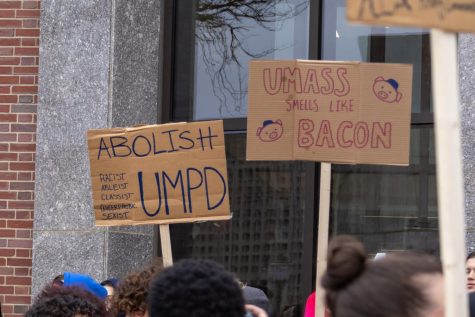
During the protest, many other issues were highlighted as “interconnected struggles,” including the recent on-campus housing crisis. Students with housing appointments were sent an email this week explaining that an estimated 900 students would not be able to select a housing assignment.
Participants of the demonstration voiced their dismay that $6 million of the $19 million student affairs budget —one third of the entire budget— was allocated to the UMPD. Meanwhile, many students were left without housing. “Don’t increase housing fees, instead defund UMPD,” was one of the chants that filled the University campus.
Terrell James, an anthropology graduate student, was at the demonstration representing the Graduate Student Union. “We want the administration to know that as a union, we are demanding that the UMPD budget be redistributed to all the different entities and campus organizations that are focused on providing high performing institutions,” he said.
UMass Dissenters’ efforts to end the University’s ties to defense contractor Raytheon Technologies was also brought to the forefront. Massachusetts police precincts, which have been trained by Israeli groups, were named as examples of the ways local police departments are tied to oppressive forces.
After the crowd walked through the campus energized with chants, it paid a visit to the Whitmore Administration Building, where demonstrators used chalk to write slogans such as “money 4 housing.”
The crowd continued on to the office of the Vice Chancellor for Student Affairs and Campus Life, Brandi Hephner LaBanc, to pass over the list of demands. LaBanc thanked the demonstrators for their advocacy but refused to give a comment to the crowd.
Ava Hawkes, co-chair of UMass Young Communist League, said at the demonstration that “a big part of our perspective is that there are already students on other campuses around the world that don’t have police on those campuses. And we think it’s really important that we join the international community of students living on a police-free campus.”
Nicolás Cardona, a junior social thought and political economy major, was there with the Revolutionary Student Action group. He explained that the University of Costa Rica, which Cardona used to attend, has been completely autonomous and run by the university community since the 1918 student movements in Argentina. He said that there is room for the same program at UMass, “if the students fight strong enough and for long enough.”
“Because in Latin America, it’s not like it was just given, it took months and years of struggle. People had to fight, people had to do sit-downs, blockades, barricades,” he said. “They had to create alliances not only between themselves, students and faculty, they had to create alliances with the broader community, with the workers at the university.”
“We want to be studying, we want to be out with our friends. We want to be enjoying the nice, almost summer days. We don’t want to have to sit in more meetings. To have to go confront the administration,” Cardona said. “We want to win. We want to be able to transform our university, to make it for everyone and stay for everyone.”
The organizers announced that the next demonstration will take place on April 12 at 7:30 p.m. in the New Africa House.
Saliha Bayrak can be reached at [email protected]. Follow her on twitter at @salihabayrak_.

